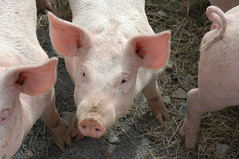Each day, the world’s finest doctors and scientists are making gigantic strides in the world of medicine. There are researchers who are designing medical technology that we cannot even begin to fathom yet. There are many more technological advancements to come in the future that some of us may rely on to survive. One recent milestone was reached just last month when a man received a kidney transplant from the organs of a pig.
You may be aware of how hard it can often be to come across a compatible organ for a transplant. In many cases patients are put on long waitlists in hopes that one day a donor will become available. Unfortunately, it can sometimes be too late. However, with recent advances in medicine, the perfect donor might be closer than we thought. As seen in this article, surgeons in Massachusetts completed the first successful pig kidney transplant. But, how could such an obscure procedure work?
It was made possible by CRISPR gene editing. According to this article, CRISPR edits genes by cutting DNA and then using natural DNA repair methods. This allows them to modify the gene as needed. In this case, the scientists cut out three genes that are responsible for making carbohydrates in pigs that our immune systems would attack. In return, they add in 7 human genes in order to prevent transplant rejection from the human body. The scientists also disable any viral DNA from the pigs’ genomes that could harm humans. These slight tweaks allow the organ to function properly in a human body without being harmful or facing the risk of organ rejection.
According to a CNN article, research and experimentation on pig kidney transplants began in the 1960s. We have certainly come a long way since then, and this huge discovery will hopefully save the lives of many in the future. Doctors hope that this can make kidney dialysis become obsolete. The man who received the transplant, Rick Slayman, hopes that this success will provide hope to those in a similar situation and make organs more accessible to those who need them.
In our AP Bio class, we practiced some gene editing of our own in a recent lab using DNA plasmids. We observed how even the smallest additions can lead to drastically different outcomes. It is very interesting to see how this also applies on a much larger scale, and the same technology is being used in the operating room. As someone with an interest in medicine, I found this story quite inspiring and it reminded me that there are still so many new discoveries to be made in the world of biology. I am interested to see how far we can come in the future.
What are your thoughts on these discoveries? Would you want to receive a pig kidney transplant?



Leave a Reply